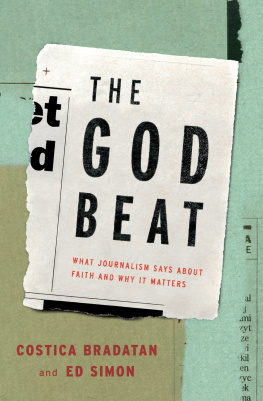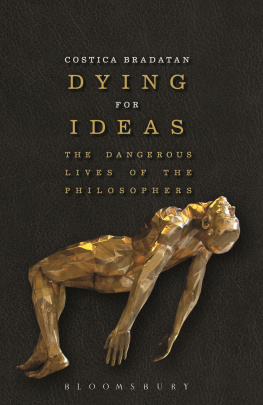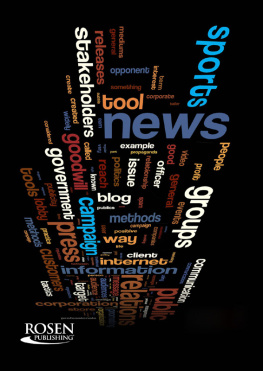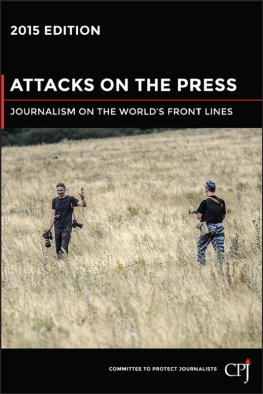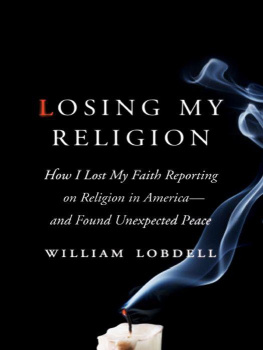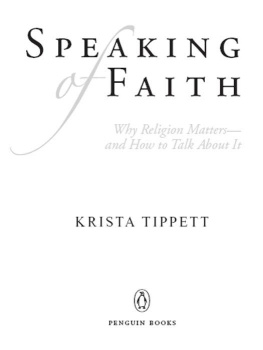Copyright 2021 Broadleaf Books, an imprint of 1517 Media. All rights reserved. Except for brief quotations in critical articles or reviews, no part of this book may be reproduced in any manner without prior written permission from the publisher. Email copyright@1517.media or write to Permissions, Broadleaf Books, PO Box 1209, Minneapolis, MN 55440-1209.
Even the most sober and analytical of seemingly objective reporting has a story to tell. Plot, narration, and character come together in journalism as surely as they do in fiction, and it doesnt court relativism to acknowledge that journalists always have to make literary choices that structure, shape, and alter what they have to say. Journalism may be defined by that famous interrogative sestetwho, what, where, when, how, and whyyet by deciding what to focus on, what to let in and what to leave out, how to shape the material and how to plot it, objective reporting still constructs its own worldwhether or not the facts themselves are unassailable. That insight was at the core of the New Journalism movement, which emerged in the 1960s and 1970s. Writers such as Truman Capote, Joan Didion, Gay Talese, Hunter S. Thompson, and Tom Wolfe revolutionized journalism by writing brash, innovative, and stylistically sophisticated essays and books that covered everything from Floridas orange juice industry to the space program. Most of all, the New Journalists had no compunction about inserting themselves into the story, embracing Thompsons claim that there is no such thing as Objective Journalism. The phrase itself is a pompous contradiction in terms.
For all its merits, the New Journalism had a secularism problem: it often ignored the questions of meaning and transcendence that lay at the center of the human experience. While the New Journalists revolutionized how politics, culture, and sports were covered in the media, the so-called God beat journalists remained much more staid in their approach, dutifully reporting the election of new popes or the goings-on at Christian colleges more than a reporters own interaction with their faithor lack thereof. More subjective articles on religion hewed to the evangelical, the New Age, or the atheistic, with all positions uncomfortable exploring the ambiguity that defines the actual religious experience. Secular newspapers, even the largest and the best of them, always tended to have fewer reporters working on the God beat than on politics, culture, sports, or even the weather page. A perhaps unconscious promotion of the secularization hypothesis: the dubious notion that religion would become less important over time.
That was until the turn of the millennium, when the 9/11 terrorist attacks reminded secular writers and readers that religion, for good and bad, was still very much pertinent in the modern world. One of the results of this new awareness was a corollary to that experimental reporting of half a century ago: a New Religion Journalism emerging to cover issues of faith with the same literary panache as a Didion or a Talese. At the Los Angeles Review of Books (itself an occasional home for New Religion Journalists), Ed Simon defined the New Religion Journalism as being a mode of nonfiction in which often personal questions of faith are interrogated against the backdrop of wider issues, where authors frequently insert themselves into the story in a manner in which more traditional God beat reporters wouldnt, and most importantly, where the theism/atheism binary is questioned and the full ambiguity and ambivalence of belief can be displayed.
If this new movement has a place of birth, its probably Jeff Sharlet and Peter Manseaus provocatively named site, Killing the Buddha. Drawing its name from a Zen koan on the need to disavow ourselves of idols in the search for truth, Killing the Buddha promoted itself as a religion site for people made uncomfortable by church, publishing neither religious apologetics nor secular diatribe but a new type of writing that was thriving in the borderlands between faith and doubt.
Such writing has covered a wide range of issues, from politics (the puzzling support of some evangelical Christians for an overtly immoral president or the emergence of important dissenting evangelical voices) to liberal social activism (the popularity of a pope who is regularly seen as progressive or to the increasing acceptance of homosexuality in mainstream denominations) to science and bioethics. When Kelly Baker writes on the role of racism in the institutional church, Ann Neumann on palliative medical care and faith, Patrick Blanchfield on religion and firearms, Nick Ripatrazone on Catholicism and literature, Jeff Kripal on New Age and paranormal faith, and Meghan OGieblyn on evangelical identity, to give just a handful of examples, all use tropes and techniques associated with the New Journalism but applied to issues of faith. Even as mainstream journalism is besieged, both politically and economically, editors have realized the crucial role that religion reporting plays, as evidenced, for instance, by the Lilly Endowments new grant program in support of hiring new religion reporters at the Religion News Service, the Conversation, and the Associated Press. Even though the phenomenon has attracted the attention of perceptive analysts and scholars, it has remained relatively neglected and understudied. Hopefully this anthology will help address this lacuna.
This collection of essays is neither exhaustive nor very systematic. Indeed, it is limited to the English-speaking world, with a focus on the US journalistic scene. The selection is meant to serve as a samplerto make people want to know more. Without a doubt, the twenty-six pieces gathered here cannot do justice to an increasingly rich, textured, and diverse journalistic literature that has religion at its center. Yet The God Beat does bring together some of the finest and most representative examples of this emerging genrefrom sites that focus on religion, such as Killing the Buddha, Religion Dispatches, and the Revealer, to generalist venues that are conversant with issues of religion, such as Aeon and the Los Angeles Review of Books.
If journalism involves the use of the storytellers tools (narrative, dramatization, characterization, and suchlike), then it should be interpreted as such. Indeed, at the heart of The God Beat lies the conceit that since any good journalism seeks to tell a story, we should expect a narrative of conflict. Directly or indirectly, explicitly or implicitly, then, an agon is to be found at the core of any good piece of journalismand the New Journalism in particular. Giving what is due to literary conventions, weve structured our anthology around essays that concern a dialectic of personal, political, scientific, and theological conflict. In other words, you will find here stories involving some sort of disjunction within the self, within society, within the natural world, and within our definitions of the divine. In each of these conflicts there are intimations of the sacred and the profane, the holy and the heretical, the blessed and the blasphemous.

